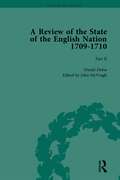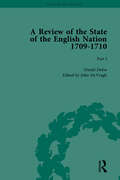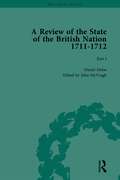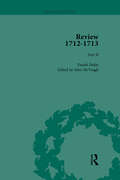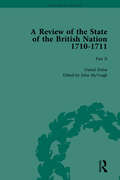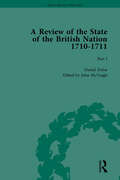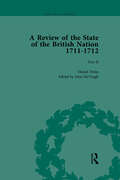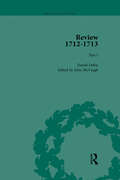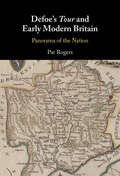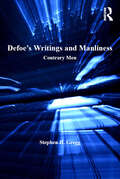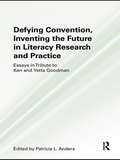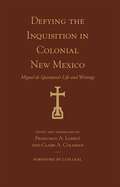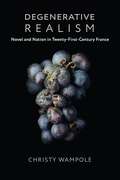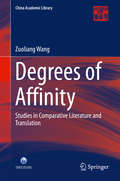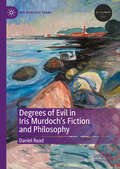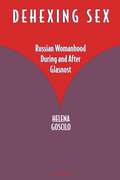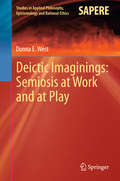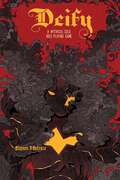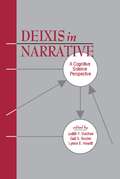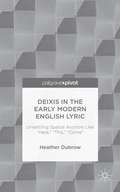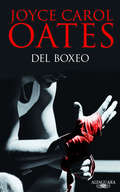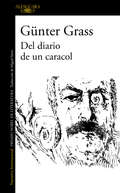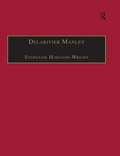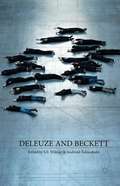- Table View
- List View
Defoe's Review 1704-13, Volume 6 (Defoe's Review 1704–13)
by John McVeagh"Defoe's Review" tapped into a new cultural community, helping to create the climate for Steele and Addison to develop the "Tatler" and "Spectator" in later years. This volume is suitable for scholars researching the history and literature of the eighteenth century, as well as the history of print and the book.
Defoe's Review 1704-13, Volume 6 (Defoe's Review 1704–13)
by John McVeagh"Defoe's Review" tapped into a new cultural community, helping to create the climate for Steele and Addison to develop the "Tatler" and "Spectator" in later years. This volume is suitable for scholars researching the history and literature of the eighteenth century, as well as the history of print and the book.
Defoe's Review 1704-13, Volume 8 (Defoe's Review 1704–13)
by John McVeaghDefoe's Review played a significant role in the birth of the modern press. It was not a newspaper dealing in facts but a journal of opinion and discussion. This series is the first complete scholarly edition of the entire run of Defoe's Review. It is fully reset and supported by full editorial apparatus.
Defoe's Review 1704–13, Volume 9 (Defoe's Review 1704–13)
by John McVeaghDefoe's Review played a significant role in the birth of the modern press. It was not a newspaper dealing in facts but a journal of opinion and discussion. This series is the first complete scholarly edition of the entire run of Defoe's Review. It is fully reset and supported by full editorial apparatus.
Defoe's Review 1704�13, Volume 7 (Defoe's Review 1704–13)
by John McVeaghDefoe's Review played a significant role in the birth of the modern press. It was not a newspaper dealing in facts but a journal of opinion and discussion. This series is the first complete scholarly edition of the entire run of Defoe's Review. It is fully reset and supported by full editorial apparatus.
Defoe's Review 1704�13, Volume 7 (Defoe's Review 1704–13)
by John McVeaghDefoe's Review played a significant role in the birth of the modern press. It was not a newspaper dealing in facts but a journal of opinion and discussion. This series is the first complete scholarly edition of the entire run of Defoe's Review. It is fully reset and supported by full editorial apparatus.
Defoe's Review 1704�13, Volume 8 (Defoe's Review 1704–13)
by John McVeaghDefoe's Review played a significant role in the birth of the modern press. It was not a newspaper dealing in facts but a journal of opinion and discussion. This series is the first complete scholarly edition of the entire run of Defoe's Review. It is fully reset and supported by full editorial apparatus.
Defoe's Review 1704�13, Volume 9 (Defoe's Review 1704–13)
by John McVeaghDefoe's Review played a significant role in the birth of the modern press. It was not a newspaper dealing in facts but a journal of opinion and discussion. This series is the first complete scholarly edition of the entire run of Defoe's Review. It is fully reset and supported by full editorial apparatus.
Defoe's Tour and Early Modern Britain: Panorama of the Nation
by Pat RogersAuthoritative yet accessible, this is the first-ever comprehensive account of a true landmark in eighteenth-century travel writing. Daniel Defoe's Tour thro' the Whole Island of Great Britain is constantly cited even now by students in practically every branch of history, and there are few topics essential to our understanding of the nation in the early modern period that do not show up in its pages. Historians since the late nineteenth century have looked to the Tour as one of the richest and most insightful works describing Britain in the lead-up to the Industrial Revolution, and critics and biographers of Defoe have regularly named it as among his most characteristic and central works. Indispensable for virtually any interdisciplinary approach to the nation in this period, this new study provides wide-reaching, up-to-date analysis of the content of the Tour, and of its methods, sources, form, and vast historical significance.
Defoe’s Writings and Manliness: Contrary Men
by Stephen H. GreggDefoe's Writings and Manliness is a timely intervention in Defoe studies and in the study of masculinity in eighteenth-century literature more generally. Arguing that Defoe's writings insistently returned to the issues of manliness and its contrary, effeminacy, this book reveals how he drew upon a complex and diverse range of discourses through which masculinity was discussed in the period. It is for this reason that this book crosses over and moves between modern paradigms for the analysis of eighteenth-century masculinity to assess Defoe's men. A combination of Defoe's clarity of vision, a spirit of contrariness and a streak of moral didacticism resulted in an idiosyncratic and restless testing of the forces surrounding his period's ideas of manliness. Defoe's men are men, but they are never unproblematically so: they display a contrariness which indicates that a failure of manliness is never very far away.
Defying Convention, Inventing the Future in Literary Research and Practice
by Patricia L. AndersKen and Yetta Goodman are renowned and revered worldwide for their pioneering, influential work in the field of reading/literacy education. In this volume major literacy scholars from around the world pay tribute to their work and offer glimpses of what the future of literacy research and practice might be. The book is structured around several themes related to research, practice, and theories of reading and literacy processes that characterize the Goodmans’ scholarship. Each chapter reveals how the author’s scholarship connects to one or both of the Goodmans’ work and projects that connection to the future – what are the implications for future research, theory, practice, and/or assessment? This milestone volume marking the hugely significant work of the Goodmans will be welcomed across the field of literacy education.
Defying the Inquisition in Colonial New Mexico: Miguel de Quintana's Life and Writings (Pasó Por Aquí Series on the Nuevomexicano Literary Heritage)
by Francisco A. Lomelí and Clark A. ColahanMiguel de Quintana was among those arriving in New Mexico with Diego de Vargas in 1694. He was active in his village of Santa Cruz de la Cañada where he was a notary and secretary to the alcalde mayor, functioning as a quasi-attorney. Being unusually literate, he also wrote personal poetry for himself and religious plays for his community. His conflicted life with local authorities began in 1734, when he was accused of being a heretic. What unfolded was a personal drama of intrigue before the colonial Inquisition.Francisco A. Lomelí and Clark Colahan dug deep into Inquisition archives to recover Quintana's writings, the second earliest in Hispanic New Mexico's literary heritage. First, they present an essay focused on Church and society in colonial New Mexico and on Quintana's life. The second portion is a translation of and critical look at Quintana's poetry and religious plays.
Degenerative Realism: Novel and Nation in Twenty-First-Century France (Literature Now)
by Christy WampoleA new strain of realism has emerged in France. The novels that embody it represent diverse fears—immigration and demographic change, radical Islam, feminism, new technologies, globalization, American capitalism, and the European Union—but these books, often best-sellers, share crucial affinities. In their dystopian visions, the collapse of France, Europe, and Western civilization is portrayed as all but certain and the literary mode of realism begins to break down. Above all, they depict a degenerative force whose effects on the nation and on reality itself can be felt.Examining key novels by Michel Houellebecq, Frédéric Beigbeder, Aurélien Bellanger, Yann Moix, and other French writers, Christy Wampole identifies and critiques this emergent tendency toward “degenerative realism.” She considers the ways these writers draw on social science, the New Journalism of the 1960s, political pamphlets, reportage, and social media to construct an atmosphere of disintegration and decline. Wampole maps how degenerative realist novels explore a world contaminated by conspiracy theories, mysticism, and misinformation, responding to the internet age’s confusion between fact and fiction with a lament for the loss of the real and an unrelenting emphasis on the role of the media in crafting reality. In a time of widespread populist anxieties over the perceived decline of the French nation, this book diagnoses the literary symptoms of today’s reactionary revival.
Degrees of Affinity
by Zuoliang WangThis book combines two collections of essays written by the late professor Zuoliang Wang, works that explore the affinity between literatures and peoples, with special attention given to that between Chinese literature and western literature in the 20th century, and which underscore the role of translation therein. Both collections have been previously published in book form: Degrees of Affinity--Studies in Comparative Literature (1985) and A Sense of Beginning--Studies in Literature and Translation (1991). As a prominent literary critic, literary historian, translator and 20th-century Chinese poet, Wang has played a unique part in English education in China. His research interests range widely, from English literature through comparative literature to translation and cultural studies, fields in which he has made outstanding accomplishments. Wang pioneered the concept of "affinity" in talking about interactions between literatures and peoples, which has since won great acclaim from both critics and common readers at home and abroad. As he points out, "momentous changes often occur when a foreign literature satisfies a sore need of an indigenous literature, thus developing a strong affinity. . . " And translation can fulfill a crucial role in bringing about affinity between literatures and peoples. According to Professor Wang, "Nothing is more crucial in cultural contacts, not to say cultural interactions, than translation, particularly in a country that for long periods closed its doors to the outside world, like China. "
Degrees of Evil in Iris Murdoch's Fiction and Philosophy (Iris Murdoch Today)
by Daniel ReadThis is the first survey of Murdoch’s exploration of evil, addressing aesthetic, philosophical, political and theological perspectives. The study demonstrates how her work engages with currently urgent issues of trauma, terrorism and psychopathy and brings her works into dialogue with key figures in twentieth- and twenty-first-century discussions of evil, including Hannah Arendt, Carl Gustav Jung, Susan Neiman and Simone Weil. These resonances are traced through close readings of Murdoch’s published fiction and philosophy in combination with unpublished texts, including annotations, interviews and letters. Murdoch’s detailed and nuanced portrayal of evil invites readers to explore the complexities of human behaviour and the potential for moral failure.
Dehexing Sex: Russian Womanhood During and After Glasnost
by Helena GosciloGlasnost and the collapse of the Soviet Union revolutionized Russian society. What effects, however, did they have on the status, role, and image of women in Russian culture? Examining the past turbulent decade of transition to "democracy" and a market economy, Dehexing Sex traces the ways in which Russia's concept of womanhood both changed and remained the same, taking into account dominant ideologies and social philosophies, sociopolitical organizations, women's writings, literary criticism, film, and popular cultural forms such as pornography. The lively, engaging chapters of this book examine texts by contemporary women writers in the context of the political, social, economic, biological, psychological, and aesthetic transformations that helped define them. Goscilo reveals that the Russian cultural revolution has reshaped the female image in varied and often contradictory ways. While increased interaction with the West fostered gender awareness, it also introduced imported Western sexist practices--especially the exploitation of female bodies--formerly proscribed by a puritanical censorship. Popular magazines, newspapers, and television propagated the image of woman as mother, ornament, and sexual object, even as women's fiction conceived of womanhood in complex psychological terms that undermined the gender stereotypes which had ruled Soviet thinking for more than 70 years. With the aid of feminist and cultural theory, Dehexing Sex investigates the overt and internalized misogyny that combined with the genuinely liberalizing forces unleashed by Gorbachev's policy of glasnost and perestroika. It exposes Russia's repressive romance with womanhood as a metaphor for nationhood and explores Russian women's ironic recasting of national mythologies. "Impressive . . . an important contribution to Russian studies and to women's studies. The author is an outstanding scholar, an energetic and original thinker, and her writing sparkles with imagination and wit." --Stephanie Sandler, Amherst College Helena Goscilo is Associate Professor and Chair of Slavic Languages and Literatures, University of Pittsburgh.
Deictic Imaginings: Semiosis at Work and at Play
by Donna E. WestThis work represents the first integrated account of how deixis operates to facilitate points of view, providing the raw material for reconciling index and object. The book offers a fresh, applied philosophical approach using original empirical evidence to show that deictic demonstratives hasten the recognition of core representational constructs. It presents a case where the comprehension of shifting points of view by means of deixis is paramount to a theory of mind and to a worldview that incorporates human components of discovering and extending spatial knowledge. The book supports Peirce's triadic sign theory as a more adequate explanatory account compared with those of Bühler and Piaget. Peirce's unitary approach underscores the artificiality of constructing a worldview driven by logical reasoning alone; it highlights the importance of self-regulation and the appreciation of otherness within a sociocultural milieu. Integral to this semiotic perspective is imagination as a primary tool for situating the self in constructed realities, thus infusing reality with new possibilities. Imagination is likewise necessary to establish postures of mind for the self and others. Within these imaginative scenarios (consisting of overt, and then covert self dialogue) children construct their own worldviews, through linguistic role-taking, as they legitimize conflicting viewpoints within imagined spatial frameworks.
Deify: A Mythical Solo Role-Playing Game
by Allyson D'AntonioDiscover Deify, a captivating creative writing RPG based on mythology from around the world. Create your own deity, molding new gods and their fate from inception to demise. Manage divine resources like domains, epithets, and mortal champions, and navigate written prompts with a tarot deck (not included). Stunning art from illustrator Maia Trewartha will inspire you to visualize unique deities born from gameplay rules, and beautifully designed player sheets and notebook pages will help you capture your journey. As your story unfolds, embrace the enigmatic world beyond worship—will you be merciful or vengeful, benevolent or cruel? The choice is yours, shaped by the cards' will. Dive into Deify for an immersive experience unlike any other! A magnificently illustrated hardcover with gold foil details.
Deixis in Narrative: A Cognitive Science Perspective
by Judith F. Duchan Gail A. Bruder Lynne E. HewittThis volume describes the theoretical and empirical results of a seven year collaborative effort of cognitive scientists to develop a computational model for narrative understanding. Disciplines represented include artificial intelligence, cognitive psychology, communicative disorders, education, English, geography, linguistics, and philosophy. The book argues for an organized representational system -- a Deictic Center (DC) -- which is constructed by readers from language in a text combined with their world knowledge. As readers approach a new text they need to gather and maintain information about who the participants are and where and when the events take place. This information plays a central role in understanding the narrative. The editors claim that readers maintain this information without explicit textual reminders by including it in their mental model of the story world. Because of the centrality of the temporal, spatial, and character information in narratives, they developed their notion of a DC as a crucial part of the reader's mental model of the narrative. The events that carry the temporal and spatial core of the narrative are linguistically and conceptually constrained according to certain principles that can be relatively well defined. A narrative obviously unfolds one word, or one sentence, at a time. This volume suggests that cognitively a narrative usually unfolds one place and time at a time. This spatio-temporal location functions as part of the DC of the narrative. It is the "here" and "now" of the reader's "mind's eye" in the world of the story. Organized into seven parts, this book describes the goal of the cognitive science project resulting in this volume, the methodological approaches taken, and the history of the collaborative effort. It provides a historical and theoretical background underlying the DC theory, including discussions of deixis in language and the nature of fiction. It goes on to outline the computational framework and how it is used to represent deixis in narrative, and details the linguistic devices implicated in the DC theory. Other subjects covered include: crosslinguistic indicators of subjectivity, psychological investigations of the use of deixis by children and adults as they process narratives, conversation, direction giving, implications for emerging literacy, and a narrator's experience in writing a short story.
Deixis in the Early Modern English Lyric: Unsettling Spatial Anchors Like Here, This, Come
by Heather DubrowThis book engages with deictics ('pointing' words like here/there, this/that) of space. It focuses on texts by Donne, Shakespeare, Spenser, and Wroth in particular, relating their forms of deixis to cultural and generic developments; but it also suggests parallels with both iconic and neglected texts from a range of later historical periods.
Del
by Barbara W. MakarA systematic, phonics-based early reading program that includes: the most practice for every skill, decodable readers for every skill, and reinforcement materials--help struggling students succeed in the regular classroom
Del boxeo
by Joyce Carol Oates«Si no se puede golpear, por lo menos se puede ser golpeado, y saber que todavía se está vivo.» Del boxeo es un ensayo sencillo, dramático y de una profundidad evocadora. Te golpea convirtiendo tus recuerdos en jumps, ganchos o rectos de derecha. Te coloca en una posición en donde la insensibilidad solo te convierte en una cosa: un boxeador. Un ensayo donde la exitosa novelista estadounidense vierte certeras reflexiones sobre ser pobre y obstinado, sobre la necesidad de crear héroes y saber triunfar, llevando su mirada y conduciendo la nuestra hacia las raíces del boxeo, aportado singulares puntos de vista sobre un tema del cual escribieron autores como Ernest Hemingway o Mark Twain: el boxeo como metáfora, como espectáculo e historia, el boxeo visto por la literatura, el cine y las mujeres. «El boxeo es una celebración de la religión perdida de la masculinidad, tanto más contundente por estar perdida.» ** Premio Ja! Bilbao por el «modernísimo humor negro» de su obra. La crítica ha dicho...«La Sra. Oates lleva al boxeo la misma inteligencia que aplica a su ficción, con su lucha humana, sus combates íntimos en público, sus decepciones, sus triunfos y fracasos de la voluntad.»The New York Times
Del diario de un caracol
by Günter GrassUno de los textos más personales del Premio Nobel alemán. Ideado como un diario de la campaña electoral que realizó en 1969 a favor de la candidatura de Willy Brandt, trasciende por su complejidad la mera anécdota política, para instalarse entre el ensayo y la prosa poética. En 1969, Günter Grass participa en la campaña electoral a favor del Partido Socialista de Alemania y, muy especialmente, de su amigo Willy Brandt. El diario de su gira le sirve luego para escribir un libro en el que las fronteras entre narrativa, política y autobiografía se confunden. El autor se dirige a sus cuatro hijos -y, así, a las nuevas generaciones alemanas- para hablarles de la democracia y de los horrores del Tercer Reich. Y crea una historia: la del profesor de instituto Hermann Ott, llamado «Zweifel» (duda), que apoyó a los judíos de Dánzig durante su persecución y expulsión. Para Grass, el riesgo está siempre en los extremos. El simbolismo político del caracol resulta claro: en la historia del progreso no hay saltos sino un lento deslizarse hacia adelante, y desde esa idea lucha contra quien pretenden sobrepasarlo por la izquierda o la derecha. «Sólo quien se ha sentado en una vacía concha de caracol y ha vivido en el lado de sombra de la Utopía puede medir el progreso.»
Delarivier Manley: Printed Writings 1641–1700: Series II, Part Three, Volume 12 (The Early Modern Englishwoman: A Facsimile Library of Essential Works & Printed Writings, 1641-1700: Series II, Part Three #Vol. 12)
by Stephanie Hodgson-WrightThe works included in this volume constitute Delarivier Manley's early oeuvre, written in the seventeenth century. They comprise one epistolary novella, Letters Written [sic] by Mrs Manley; one commendatory poem 'To the Author of Agnes de Castro'; one comedy, The Lost Lover, or The Jealous Husband, one tragedy, The Royal Mischief; and two commemorative poems, 'Melpomeme: The Tragick Muse' and 'Thalia: The Comick Muse'. In the light of new readings of Delarivier Manley's early work, this volume demonstrates her important contribution to the literary and theatrical milieu of the late seventeenth century.
Deleuze and Beckett
by S. E. Wilmer Audronė ŽukauskaitėDeleuze and Beckett is a collection of essays illuminating similarities between the philosophies and practices of Deleuze and Beckett. The contributors include some of the leading Beckett and Deleuze specialists in the world, and their essays address different ideas and concepts of Deleuzian philosophy as well as a wide range of Beckett's oeuvre, including his novels, short stories, stage and television plays, and film work. The book considers Deleuze's interpretation of Beckett's work anddemonstrates that Deleuzian concepts and ideas can be usefully applied to Beckett's texts in order provide a greater understanding of Beckett's characters and their journeys. Deleuze's philosophy helps us to recognize that what has been seen as the private territory of despair, loneliness, and emptiness in Beckett's work masks a world of flow and fluctuation that expresses multiple and heterogeneous possibilities.
